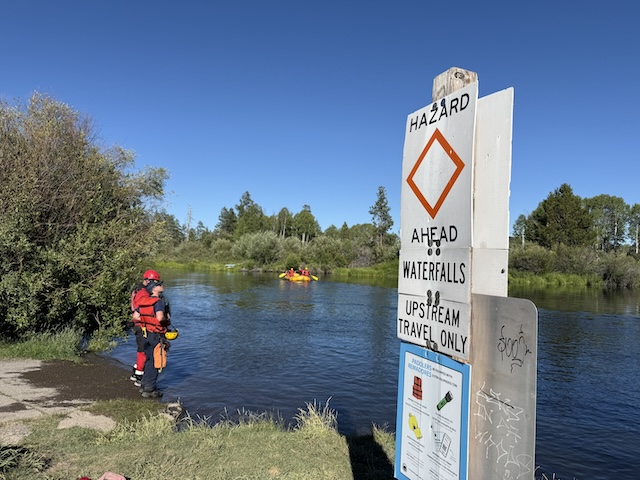Deschutes court officials ‘cautiously optimistic’ public defender crisis has abated
Published 5:45 am Friday, December 20, 2024

- Court is in session in Judge Wells Ashby’s courtroom in the Deschutes County Courthouse in Bend in 2021.
The number of defendants without a court-appointed attorney in Deschutes County has dropped to zero, court officials say, bringing a possible resolution to the public defender shortage that has often delayed cases as defendants awaited a lawyer to take their case.
Judge Wells Ashby, presiding judge in Deschutes County Circuit Court, told The Bulletin he is “cautiously optimistic” the crisis is ending.
Trending
The public defender staffing crisis in Deschutes County reached a tipping point in October when approximately 150 people were unable to obtain representation because of the shortage.
As of Dec. 17, the number statewide had risen to more than 5,300 people without representation, mostly in Multnomah, Marion, Jackson, Washington and Douglas Counties, according to Jessica Kampfe, the executive director of the Oregon Public Defense Commission. Without the capacity to provide people with their legal right to an attorney, many of these cases are put on hold.
But Deschutes County Circuit Court has been able to tackle the crisis by putting pressure on the Oregon Public Defense Commission to speed up the public defender approval process while also calling on community partners to help fill the gap while more public defenders are hired, said Ashby.
Not enough lawyers
In Deschutes County, the courts obtain public defenders for those who need counsel from three local groups: Deschutes Defenders, Atlas Law Group and Bend Attorney Group. In May, The Bulletin reported that the firms would collectively be losing six attorneys by June, worsening the shortage that Ashby said has been going on for more than two years.
“One of the things that really helped us (solve this crisis) was the firms — our three primary defense groups — were able to add attorneys and increase their capacity,” Ashby said. “In terms of going into 2025, we have fairly high confidence that we’re not going to get back into this situation, certainly not on this scale,” Ashby said.
Trending
Deschutes County District Attorney Steve Gunnels, however, pointed out that the structural inadequacies — such poor benefits and pay for public defenders as well as the Oregon Public Defense Commission’s maximum acceptable case load — could put the county right back in crisis mode if they aren’t solved.
“I think the issue that brought this on still exists, which is the artificial cap on the number of cases that defense attorneys can take being imposed by the Oregon Public Defense Commission. That’s the reason that we have thousands of criminal cases around the state with unrepresented individuals,” Gunnels said.
Even though a public defender might have the time and the resources to take on additional cases, Gunnels said the state’s oversight on this point has been a major barrier to solving the public defender shortage. The cap is set on a sliding scale established with reference to standards set by the American Bar Association.
That could change come Jan. 1 though, when the governor’s office takes control of the Oregon Public Defense Commission’s operations from the Chief Justice of the Oregon Supreme Court.
“As we move from the judicial branch to the executive branch, our top priority will continue to be to reduce the number of unrepresented individuals,” said Kampfe. “Furthermore, we plan to transition providers to a workload model that better accounts for the hours attorneys need to advocate for their clients.”
A lack of urgency from
the state
Read More:
Editorial: Plan to get Oregon out of public defense crisis is costly and comes with questions
Ashby said that one reason the crisis in Deschutes County went on so long was because he was seeing “a real lack of urgency from the Oregon Public Defense Commission” to get the open positions at public defense firms filled.
“We realized we were going to have to solve this on our own …” Ashby said. “The private bar stepped up and said (they would) take a few cases. Our legislative delegation got involved — (state Rep.) Jason Kropf took a case — and we brought, frankly, the press in to bring some attention to this.”
The Oregon Public Defense Commission doesn’t approve or reject hiring decisions made by public defense firms, said Kampfe, but the oversight commission does determine what level of cases attorneys can take on based on their qualification standards. When a firm wishes to hire a new attorney, they must submit a qualification form to the commission for approval.
A big issue, Ashby said, is that by the time the commission would issue its approval, candidates had been hired elsewhere.
Kampfe said that seven cases from Deschutes County were taken on by attorneys from the Oregon Public Defense Commission office in Salem and that the commission’s hourly rate program was expanded.
“One of our staff members diligently worked to make sure that all cases were covered by hourly providers when contractors couldn’t take them. We brought in new hourly attorneys and used attorneys from other counties to cover the shortfall,” Kampfe said. “We’ve assigned 141 cases in Deschutes County under our increased hourly rate program.”
Moving into 2025, Kampfe said the commission does have plans to continue combating the public defender shortage.
“In 2025, we plan to continue to invest in growing Oregon’s public defense workforce across all types of providers. A key component of that will be to continue expanding the number of state-employed public defenders,” Kampfe said. “Additionally, we plan to continue implementing SB 337 by establishing a panel of hourly attorneys by July 2027.”
SB 337, passed by the Legislature in 2023, moved the commission to the executive branch and implemented measures meant to improve and streamline indigent defense.
Court working hard
Ashby and Gunnels attribute the rapid decline in unrepresented defendants to the dedication of court staff who have worked to find representation for those who need a public defender. Ultimately, Ashby said, it came down to the fact that the three main public defense firms were able to hire additional staff to take on these unrepresented cases, and the Central Oregon legal community stepped up to the plate while that was being accomplished.
According to data obtained from the Oregon Public Defense Commission, 11 attorneys were hired between Atlas Law Group, Deschutes Defenders, and Bend Attorney Group. This means there will be six additional public defenders in 2025 to tackle formerly unrepresented cases throughout Deschutes County.
While things are looking up, Gunnels made a point to say that the causes behind the attorney shortage haven’t gone away, because without legislators working to resolve the deeper, structural issues on a state level, there’s every possibility that Deschutes County could end up in the same place again.
“Hopefully the newly hired public defenders will stay with the public defense firms for a number of years and that there won’t be another attorney shortage. But as our community grows, we receive more criminal cases and we’ll need to continue to to have a defensive bar that can take all of the criminal cases that we file. That growth challenge is always going to be there for us,” Gunnels said.








